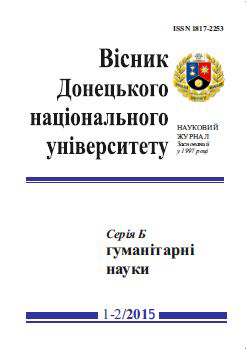Prospects for the unity of mankind in the posttoynbee’s philosophy of history.
Keywords:
the unity of mankind, posttoynbee’s philosophy of history, globalization, westernization, nationalismAbstract
The problem of prospects for the unity of humanity and its solution in the posttoynbee’s philosophy of history are considered in the article. This problem is investigated through the analysis of the philosophical views of the major representatives of posttoynbee’s philosophy such as W. McNeill, I. Wallerstein, I. Gudsblom, D. Wilkinson. Globalization as the main trend of development of the modern world is analyzed in the article. Posttoynbee’s philosophy recognizes the existence of the modern multicivilisational world with its gradual pursuit to a single global civilization. Philosophical analysis of globalization, westernization and americanization as the key characteristics of the current stage of world order, the possible ways of saving civilization code of local civilizations are presented in the article. Globalization is a complex and controversial process, which in its most general form is reduced to the formation of a common humanity, the increasing interdependence of cultures and peoples. Globalization is a nonlinear, very controversial and uneven process, such that is constantly changing its forms, methods and mechanisms of implementation, the process of historical creativity. The concept of "westernization" is more suited to defining globalization of the nineteenth and twentieth centuries. The modern stage of its more advisable to link the "Americanization", that is the American vision of globalization, when the process of establishing a common humanity should be based on American ideals and values. The main criteria for the unity of mankind, such as biological, geographical, political, economic, financial and cultural are analyzed in the article. Evidence of the unity of humanity in all of these criteria is not in doubt, we cannot say about the cultural factor. Positions of globalists and antiglobalists are presented in the article. Formation of common humanity is a natural objective historical process that characterizes the internal needs of civilization. The internal formation of global civilization is not a simple mechanical merger of various local civilizations but is the increase and complication of relationships that leads to supra-national and supranational integration with the final appearance of a complex system that functions as a single organism. The main aspiration of globalization on the formation of a single integrated humanity while generating opposition movement to preserve and strengthen the local borders of civilisational spaces. At the present stage the world is not yet completed is a unity, because of the fragmentation and polarization is not yet overcome. The main subject of history stands today, is still not integrated global humanity and civilization separate entity. Along with globalization reinforced the position of nationalism as defense mechanism of localization saving the world. Each local civilization continues to provide livelihoods own civilization code that serves to drive international diplomatic confrontation and conflicts.References
Валлерстайн И. Конец знакомого мира: Социология XXI века / Пер. с англ. под ред. Б. Л. Иноземцева; Центр исследований постиндустриального общества. – М.: Логос, 2003. – 368 с.
Гудсблом Й. История человечества и долговременные социальные процессы: к синтезу хронологии и фразеологии / Й. Гудсблом // Время мира. Альманах. Выпуск 2. – Новосибирск: Сибирский хронограф, 2001. − С.117-132.
Иноземцев В. Л. Глобализация: иллюзии и реальность / В. Л. Иноземцев // Свободная мысль. − 2000. − № 1. − С. 26-36.
Гранин Ю. Д. «Глобализация» или «вестернизация»? / Ю. Д. Гранин // Свободная мысль. – 2013. − № 1/2. − С. 51-64.
Дилигенский Г. Г. «Конец истории» или смена цивилизаций? / Г. Г. Дилигенский // Вопросы философии. −1991. − №3. − С. 29-42.
Макнил В. Меняющийся образ всемирной истории / В. Макнил // Время мира. Альманах. Выпуск 2. – Новосибирск: Сибирский хронограф, 2001. – С. 16-38.
Буров В. Г. Китайский опыт модернизации: теория и практика / В. Г. Буров, В. Г. Федотова // Вопросы философии: Научно-теоретический журнал. – 2007. − № 5. – С. 7-20.
Тишунина Н. В. Современные глобализационные процессы: вызов, рефлекси, стратеги / Н. В. Тишунина // Глобализация и культура: аналитический подход. − СПб.: Янус, 2003. − С. 5-24.
Кирчанов М. В. Национализм: политика, международные отношения, регионализация: учебное пособие для вузов (курс лекция) / М. В. Кирчанов. – Воронеж, 2007. – 283 с.

